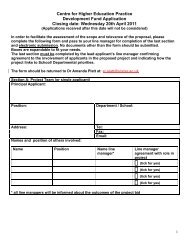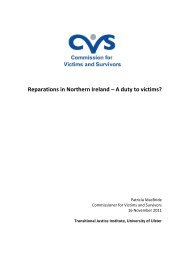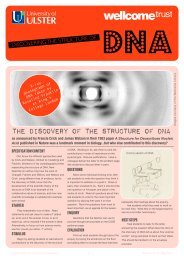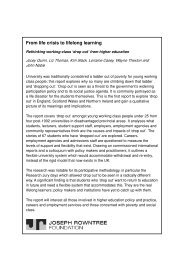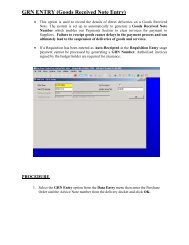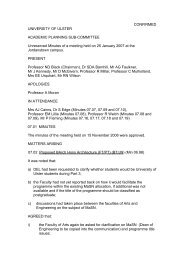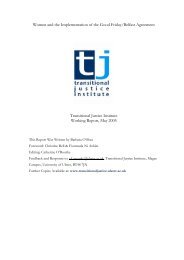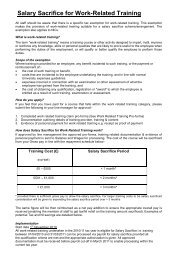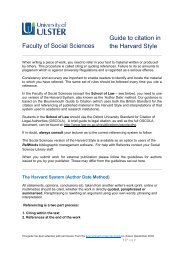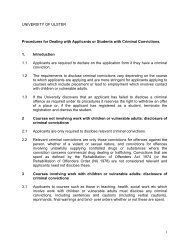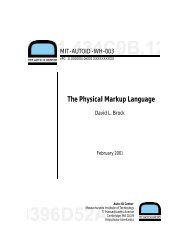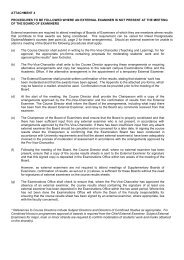Magee - University of Ulster
Magee - University of Ulster
Magee - University of Ulster
You also want an ePaper? Increase the reach of your titles
YUMPU automatically turns print PDFs into web optimized ePapers that Google loves.
UNIVERSITY OF ULSTER<br />
INSTRUCTIONS TO INVIGILATORS (MAGEE)<br />
SUMMARY OF INVIGILATION ACTIVITIES<br />
The following is a summary <strong>of</strong> the principal invigilation activities contained in the attached<br />
Instructions to Invigilators.<br />
A DUTIES UNDERTAKEN PRIOR TO THE COMMENCEMENT OF THE SESSION<br />
A1 Invigilators for the Sports Hall, MF217 and MF231 report to the Senior Invigilator <strong>of</strong><br />
the centre at least thirty minutes before the commencement <strong>of</strong> the examination<br />
session (for other examination venues the report time is at least twenty minutes).<br />
Examination papers for the Sports Hall, MF217 and MF231 are brought to these<br />
rooms by a member <strong>of</strong> Examinations Office staff. For other venues the papers are<br />
collected by the Senior Invigilator from the Examinations Office (Room MD130) on<br />
the day <strong>of</strong> the examination. (section 2.1)<br />
A2 Invigilators place examination papers and stationery on desks. (section 2.2)<br />
A3 Candidates are admitted at least ten minutes before the commencement <strong>of</strong> the<br />
session and are seated under the supervision <strong>of</strong> the invigilators. (section 2.3 and<br />
2.4)<br />
A4 Invigilators ensure that unauthorised materials, calculators and bags are suitably<br />
and safely deposited. (section 2.5 and Appendix IV)<br />
A5 The Senior Invigilator reads out to candidates the relevant announcements (refer to<br />
announcement sheet in the examinations room folder) placing particular emphasis<br />
on (1) the regulation on mobile phones and (2) a new instruction which advises<br />
students to remain seated at their desk until an invigilator collects their script<br />
(section 4.12)<br />
A6 The Senior Invigilator instructs candidates on the emergency procedures <strong>of</strong> the venue<br />
prior to the start <strong>of</strong> the examination.<br />
The examination session commences.<br />
B DUTIES UNDERTAKEN DURING THE SESSION<br />
B1 Invigilators patrol the examination room:<br />
• to ensure strict enforcement <strong>of</strong> the regulations and as a deterrent to cheating;<br />
(section 1.4 and Extract from Regulations Governing Examinations in<br />
Courses <strong>of</strong> Study)<br />
• to ensure that candidates are not using unauthorised materials/calculators.<br />
(section 4.2 and Appendix IV)<br />
B2 Invigilators report immediately to the Senior Invigilator any concerns raised by a<br />
candidate about the conduct <strong>of</strong> the examination.<br />
1
B3 Candidates who leave the room temporarily are accompanied by an invigilator.<br />
(section 4.7)<br />
B4 After fifteen minutes has elapsed (for the admittance to the centre <strong>of</strong> late students)<br />
invigilators check student ID cards against the Invigilator’s Report forms, record any<br />
absentees and verify each student’s identity from the photograph on the card or<br />
other photographic evidence. (section 4.9)<br />
B5 The Senior Invigilator reminds candidates fifteen minutes before the end <strong>of</strong> the<br />
examination session <strong>of</strong> the time remaining to complete the examination. (section<br />
4.10)<br />
B6 The Senior Invigilator, at the appropriate time, informs candidates who are taking<br />
examinations which finish earlier than other examinations in the centre that they<br />
must stop writing and remain in their seats until an invigilator collects their<br />
script. (section 4.11)<br />
B7 The Senior Invigilator and/or other invigilators take appropriate action in relation to:<br />
• queries about examination papers; (section 4.1)<br />
• special circumstances relating to the arrival <strong>of</strong> a number <strong>of</strong> students after the<br />
one hour period for late admittance has elapsed; (section 4.3)<br />
• Any incidents <strong>of</strong> disruption or any other matter <strong>of</strong> concern raised by a candidate<br />
during the examination (section 4.4)<br />
• instances <strong>of</strong> alleged cheating; (section 4.5)<br />
• emergency evacuation; (section 4.6)<br />
• A missing examination script (section 5.1)<br />
• students who become ill or suffer examination stress, or require special<br />
examination arrangements (Appendices II, III and V).<br />
The examination session concludes.<br />
C DUTIES UNDERTAKEN AFTER THE SESSION<br />
C1 Invigilators collect examination materials from desks as follows:<br />
• scripts are collected while students remain seated in seat number (ie ID<br />
number) order within module;<br />
• each script is recorded on the Invigilator’s Report form which is then signed;<br />
• the scripts for each module are inserted in the envelope provided, along with the<br />
Invigilator’s Report form, spare examination papers, and any ‘Nil Return’ forms<br />
and ‘Missing Script Report’ forms;<br />
• the invigilator completes the details on the front <strong>of</strong> the envelope and signs in the<br />
space provided;<br />
• completed envelopes are returned to the Examinations Office (MD130).<br />
(sections 5.1 and 5.2)<br />
C2 The Senior Invigilator completes and returns to the Examinations Office the Senior<br />
Invigilator’s Report form. (section 5.3)<br />
2
UNIVERSITY OF ULSTER<br />
UNIVERSITY EXAMINATIONS: INSTRUCTIONS TO INVIGILATORS<br />
(MAGEE)<br />
1. PREAMBLE<br />
1.1 Invigilators are appointed to be responsible for the efficient supervision <strong>of</strong><br />
examinations which must be conducted in accordance with <strong>University</strong> Regulations (a<br />
copy <strong>of</strong> which is attached). There should be a minimum <strong>of</strong> one invigilator to 40<br />
candidates.<br />
1.2 A minimum <strong>of</strong> two invigilators shall be appointed for each examination centre; one <strong>of</strong><br />
these invigilators shall be appointed as Senior Invigilator. Within the framework set out<br />
in this document, the Senior Invigilator shall decide all matters concerned with the<br />
conduct <strong>of</strong> the examination session.<br />
1.3 The Senior Invigilator shall be in charge <strong>of</strong> arrangements in the examination centre<br />
and shall have the right to require the withdrawal <strong>of</strong> any person considered to be<br />
disruptive.<br />
1.4. The Senior Invigilator shall ensure that all invigilators perform their work properly. This<br />
includes regular and systematic patrolling <strong>of</strong> the examination centre as a deterrent to<br />
cheating and to ensure strict enforcement <strong>of</strong> the examination regulations, e.g., the<br />
prevention <strong>of</strong> candidates talking to one another at the commencement and conclusion<br />
<strong>of</strong> examinations. Invigilators’ in the main venues are not allowed to bring in their<br />
own examination scripts into invigilation sessions (point 3, invigilators<br />
schedule). If a Senior Invigilator considers that an invigilator is not performing his or<br />
her duties diligently (including keeping good time and paying full attention to the<br />
supervision <strong>of</strong> the examination) the Senior Invigilator may refer the matter to the Chief<br />
Finance and Information Officer (Finance & Information Services Directorate).<br />
1.5 The Senior Invigilator should ensure that invigilators do not engage in conversation<br />
during the session, except where necessary for the conduct <strong>of</strong> the examination.<br />
Unnecessary conversation can be disruptive to students and may be grounds for<br />
appeal. Students are advised in the announcement given at the commencement <strong>of</strong><br />
the session that any concerns relating to the conduct <strong>of</strong> the examination should be<br />
brought immediately to the attention <strong>of</strong> an invigilator.<br />
1.6 Invigilators shall follow the security procedures set out in Appendix I.<br />
3
2. BEFORE THE EXAMINATION SESSION<br />
The following procedures shall be observed:<br />
2.1 (a) For examinations to be held in the Sports Hall, MF231 and MF217<br />
Invigilators shall report to the Senior Invigilator <strong>of</strong> the centre at least 30<br />
minutes before the examination session is due to begin and shall remain<br />
throughout except where permission to leave is granted by the Senior<br />
Invigilator.<br />
Examinations Office staff will have brought all examination papers and<br />
stationery to the centre and will remain for as long as their services are<br />
required.<br />
(b) For examinations to be held in any centre<br />
The Senior Invigilator shall collect all examination papers from the<br />
Examinations Office on the day <strong>of</strong> the examination. Invigilators shall report to<br />
the Senior Invigilator at least 20 minutes before the examination session is due<br />
to begin and shall remain throughout except where permission to leave is<br />
granted by the Senior Invigilator.<br />
(c) For all evening examinations<br />
The Senior Invigilator shall collect all examination papers and stationery from<br />
the Examinations Office before 3.00pm on the day <strong>of</strong> the examination.<br />
Invigilators shall report to the Senior Invigilator at least 20 minutes before the<br />
examination session is due to begin and shall remain throughout except where<br />
permission to leave is granted by the Senior Invigilator.<br />
2.2 Invigilators shall place examination papers on the appropriate desks and distribute<br />
examination stationery.<br />
2.3 Candidates shall be admitted to the examination room at least 10 minutes before the<br />
start <strong>of</strong> the examination and invigilators shall supervise the seating <strong>of</strong> candidates to<br />
ensure that examinations begin on time. Candidates’ desk numbers are indicated on<br />
their examination timetables. An alphabetical listing showing seat numbers is available<br />
in the centre for the assistance <strong>of</strong> the invigilators.<br />
2.4 A candidate who has been wrongly enrolled for a module, or who has failed to enrol<br />
for a module, will not have been allocated a seat number. The candidate shall be<br />
given a vacant seat in the centre and the ID number and seat number shall be added<br />
to the Invigilator's Report form for the appropriate module. Examinations Office staff<br />
will be able to advise invigilators <strong>of</strong> the empty seats available.<br />
2.5 Any unauthorised material, proscribed calculators as identified in Appendix IV, mobile<br />
phones, iPods or MP3s brought in by a candidate must be switched <strong>of</strong>f and placed in<br />
the candidate’s bag. Invigilators shall ensure that any bags brought into an<br />
examination centre are deposited in a prescribed area.<br />
4
3. AT THE COMMENCEMENT OF THE EXAMINATION SESSION<br />
The Senior Invigilator shall inform candidates that:<br />
in addition to the instructions in their examination timetable they should note the<br />
following points:<br />
3.1 Please place your ID card on the top right hand corner <strong>of</strong> the desk so that the<br />
invigilator may check your number against the invigilation report;<br />
3.2 Unless otherwise authorised, only your ID card, writing instrument(s), question paper<br />
and script book are allowed on your desk. Pencil cases and calculator cases are not<br />
permitted in the examination room. If you have your examination timetable with you it<br />
must be placed on the floor beneath your desk.<br />
3.3 Mobile phones, iPods, MP3s or similar devices are not permitted in Examination<br />
Centres. If you have any <strong>of</strong> these devices with you, please ensure that they are<br />
switched <strong>of</strong>f and placed in your bag or on the floor beneath your desk.<br />
Possession <strong>of</strong> unauthorised material or devices is sufficient cause for a Board <strong>of</strong><br />
Examiners to declare your examination void. Cheating in examinations is a<br />
serious <strong>of</strong>fence and invigilators will be exercising vigilance in its detection.<br />
3.4 If you require anything during the examination, or if you wish to leave the room<br />
temporarily, raise your hand to attract the attention <strong>of</strong> an invigilator. Candidates<br />
leaving temporarily must be accompanied by an invigilator or other authorised<br />
person.<br />
3.5 If at any time during this session you have a concern about the conduct <strong>of</strong> the<br />
examination that might affect your performance you should raise the issue<br />
immediately with an invigilator.<br />
3.6 Candidates must not communicate with one another during the examination;<br />
3.7 Please read the directions on the front cover <strong>of</strong> your examination script and ensure<br />
that you have the correct paper in front <strong>of</strong> you.<br />
3.8 If you do not wish to submit a script for marking you should complete and sign a 'Nil<br />
Return' form;<br />
3.9 You may not leave the examination during the first hour nor during the final fifteen<br />
minutes <strong>of</strong> the session.<br />
3.10 You must remain seated at your desk until an invigilator collects your script. You<br />
should leave once your script is collected and you should do so quietly as there may<br />
be other students still doing examinations.<br />
3.11 You must not remove any examination answer booklets from the hall.<br />
5
4. DURING THE EXAMINATION SESSION<br />
The following procedures shall be observed:<br />
4.1 Module co-ordinators are not required to attend the examination centre when the<br />
module for which they are responsible is being examined but they should advise the<br />
school secretary <strong>of</strong> their location and telephone number, should they need to be<br />
contacted.<br />
If an alleged error is discovered in an examination paper the invigilator(s) should<br />
contact the school secretary to have the module co-ordinator attend the examination<br />
centre. If problems are encountered in locating the module co-ordinator the<br />
invigilator(s) should contact the Examinations Office.<br />
Any such difficulty should be recorded on the Invigilator’s Report form. No information<br />
relating to the examination paper, additional to that contained in the paper, shall be<br />
conveyed to candidates, except to correct an error, in which case the information shall<br />
be provided to all candidates taking the examination.<br />
4.2 Invigilators shall ensure that candidates are not in possession <strong>of</strong> material, including<br />
books, notes, proscribed calculators or other electronic devices not authorised by the<br />
examiners (See Appendix IV). Random checking <strong>of</strong> calculators should be undertaken<br />
to ensure that notes are not taped on the underside.<br />
NB. If the faculty is concerned that calculators could be misused then the<br />
module co-ordinator or a nominee should attend the examination to<br />
ensure that only calculators conforming to the approved standard are<br />
used.<br />
4.3 Where there are circumstances resulting in the late arrival <strong>of</strong> a number <strong>of</strong> students, the<br />
Senior Invigilator may, at his/her discretion, make appropriate arrangements for the<br />
students to complete the examination. Details <strong>of</strong> such incidents must be included in<br />
the Invigilator's Report form.<br />
4.4 Any incidents <strong>of</strong> disruption or any other issue raised by a candidate that may affect<br />
their performance in the examination should be reported immediately to the Senior<br />
Invigilator who will decide what action should be taken to, as far as possible, remedy<br />
the situation. In addition the Senior Invigilator shall record the student’s name and ID<br />
number, the issue raised and the action taken in the Senior Invigilator’s Report form.<br />
4.5 In any instance <strong>of</strong> alleged cheating the Senior Invigilator shall:<br />
(a) remove and retain any material, including proscribed calculators or other<br />
electronic devices, which are considered to be unauthorised;<br />
(b) unless there are strong reasons to the contrary, permit the candidate to<br />
complete the examination;<br />
(c) submit a written report on the circumstances, accompanied by any relevant<br />
supporting material and the candidate's examination script, to the Dean <strong>of</strong> the<br />
Faculty in which the candidate is registered.<br />
6
(The detailed procedures for dealing with instances <strong>of</strong> alleged cheating in<br />
examinations are contained in the paper "Procedures for Dealing with Reports<br />
<strong>of</strong> Alleged Offences in Connection with Examinations and Other Forms <strong>of</strong><br />
Assessment". Copies available through the staff portal, My Teaching tab.<br />
4.6 In the event <strong>of</strong> an emergency where the Senior Invigilator is informed that the centre<br />
requires to be evacuated, or where the fire alarm sounds continuously within the block<br />
where the examination session is being held, the Senior Invigilator shall:<br />
(a) inform the candidates that the centre is to be evacuated;<br />
(b) instruct the candidates to leave their answer books and examination papers on<br />
the desks and stress that they must not discuss the examination;<br />
(c) oversee the evacuation <strong>of</strong> the centre and accompany the candidates to the<br />
nearest assembly point (see Appendix V1);<br />
(d) note the time at which the examination session was interrupted;<br />
(e) when permission is given to re-enter the building, accompany the candidates<br />
into the examination centre;<br />
(f) decide if the examination session should be completed.<br />
Details <strong>of</strong> any interruptions and recommendations must be included in the<br />
Invigilator's Report form.<br />
4.7 Candidates who leave an examination temporarily must be accompanied by an<br />
invigilator or other person authorised by the Senior Invigilator.<br />
4.8 Invigilators shall follow the procedure for assisting candidates who become ill during<br />
the examination (see Appendix II) or who are under stress (see Appendix III) or who<br />
require special arrangements due to disability or other special needs (see Appendix<br />
V).<br />
4.9 Invigilators shall check the student ID card against the Invigilator's Report form and<br />
mark any absentees. They shall also check each student's identity against the student<br />
ID card. Where a student is unable to present an ID card, alternative photographic<br />
evidence bearing a name and deemed to be suitable by the invigilator will be<br />
acceptable, e.g., a driving licence. In such a case the invigilator shall check the<br />
student’s name against the alphabetical list <strong>of</strong> candidates referred to at 2.3 above.<br />
(This is to ensure that the candidate’s name, as proven by his/her photograph,<br />
matches the ID number on the listing.) In the absence <strong>of</strong> suitable identification the<br />
invigilator shall write on the front cover <strong>of</strong> the script for the attention <strong>of</strong> the module<br />
coordinator ‘No pro<strong>of</strong> <strong>of</strong> identity’.<br />
4.10 The Senior Invigilator shall, fifteen minutes before the end <strong>of</strong> the examination session,<br />
inform candidates <strong>of</strong> the time remaining to complete the examination and that they<br />
may not leave until the end <strong>of</strong> the examination session.<br />
7
4.11 The Senior Invigilator shall, at the appropriate time, inform candidates who are taking<br />
examination papers which finish earlier than other examinations in the centre that they<br />
should stop writing.<br />
4.12 Candidates shall be informed that they must remain seated at their desk until an<br />
invigilator collects their script and leave the room quietly once the script has been<br />
collected as there may be other students still doing examinations.<br />
5. AFTER THE EXAMINATION SESSION<br />
The following procedures shall be observed:<br />
5.1 Invigilators shall collect all examination material from the desks Students are<br />
seated in ID Number order within module and invigilators shall collect<br />
scripts strictly in this order while students are still seated. Each script<br />
received shall be recorded in the Invigilator’s Report form which shall then be<br />
signed by the invigilators. The completed scripts for each module shall be<br />
inserted in the envelope provided, still in strict ID number order, together with<br />
spare examination question papers, the Invigilator’s Report form and any ‘Nil<br />
Return’ forms.<br />
Candidates may retain the question paper unless it is specified that it shall not be<br />
removed. Where a script is missing for a candidate who is marked on the<br />
Invigilator’s Report Form as being present for an examination, and where a<br />
subsequent search fails to locate the script, a Missing Script Report form shall be<br />
completed by the Senior Invigilator.<br />
The bottom copy <strong>of</strong> the form shall be enclosed with the scripts. The top copy<br />
should be returned to the Examinations Office.<br />
5.2 Invigilators shall return the script envelopes and the top copy <strong>of</strong> any Missing Script<br />
Report form to the Examinations Office. Scripts will be signed out to internal<br />
examiners if requested.<br />
5.3 The Senior Invigilator shall complete the Senior Invigilator’s Report form and return it<br />
to the Examinations Office immediately after the examination session.<br />
NOTE: THE EXAMINATIONS OFFICE AT MAGEE IS LOCATED IN MD130 AND<br />
THE TELEPHONE EXTENSION IS 75258<br />
8
APPENDIX 1<br />
SECURITY ARRANGEMENTS<br />
In the event <strong>of</strong> an evacuation, see Appendix VI.<br />
Students may bring bags, books, etc into the examination centre only with the permission <strong>of</strong><br />
the invigilators and provided these are left in a prescribed area.<br />
APPENDIX II<br />
PROCEDURES FOR ASSISTING STUDENTS WHO BECOME ILL<br />
If a candidate becomes ill during an examination the invigilator shall telephone the Health<br />
Centre (extension 75218 at <strong>Magee</strong>) to request medical assistance.<br />
The nurse may go to the examination centre to meet the candidate or, if it is thought more<br />
appropriate, the invigilator may escort the candidate to the Health Centre.<br />
Arrangements should be made, if possible, for the candidate to continue the examination.<br />
When a candidate goes to the Health Centre the examination paper and answer book shall<br />
also be taken so that the examination may recommence, if desired, in an appropriate<br />
environment under the supervision <strong>of</strong> an academic invigilator. (Note: if the candidate can not<br />
be accommodated in the Health Centre the invigilator should contact the Examinations Office<br />
to check if a suitable special needs venue is available where the candidate can continue with<br />
the examination.)<br />
Should there be any doubt about a candidate's condition (i.e. whether illness or stress) both<br />
the nurse and the counsellor should be telephoned. (extension 75218 at <strong>Magee</strong>)<br />
Staff from Student Support will be available to assist during daytime and Saturday morning<br />
examinations at the end <strong>of</strong> Semesters 1 and 2.<br />
At other times, assistance may be sought from qualified First Aiders on the Security Staff<br />
(extension 75262 at <strong>Magee</strong>). In cases <strong>of</strong> serious concern, emergency services should also be<br />
contacted without delay.<br />
9
APPENDIX III<br />
PROCEDURES FOR ASSISTING STUDENTS WHO ARE UNDER STRESS<br />
If a candidate is in a distressed condition either immediately prior to or during an examination,<br />
the invigilator shall telephone the <strong>University</strong> Counselling Service (extension 75218 at <strong>Magee</strong>).<br />
The counsellor may then go to the examination centre to meet the candidate or, if it is thought<br />
more appropriate, the invigilator may escort the candidate to the Counselling Service Area.<br />
The invigilator shall note on the answer book the time the student left the examination centre<br />
and the reason for leaving.<br />
Arrangements shall be made, if possible, for the candidate to continue the examination.<br />
When a candidate goes to the <strong>of</strong>fice <strong>of</strong> the Counselling Service the examination paper and<br />
answer book shall also be taken so that the examination may recommence, if desired, in an<br />
appropriate environment under the supervision <strong>of</strong> an academic invigilator. (Note: if the<br />
candidate can not be accommodated in the Health Centre the invigilator should contact the<br />
Examinations Office to check if a suitable special needs venue is available where the<br />
candidate can continue with the examination.)<br />
Should there be any doubt about a candidate's condition (i.e. whether stress or illness) both<br />
the counsellor and the nurse should be telephoned (extension 75218 at <strong>Magee</strong>).<br />
Staff from Student Support will be available to assist during daytime and Saturday morning<br />
examinations at the end <strong>of</strong> Semesters 1 and 2. At other times, where there are physical<br />
symptoms <strong>of</strong> stress such as hyperventilation, assistance may be sought from qualified First<br />
Aiders on the Security Staff.<br />
10
APPENDIX IV<br />
POLICY ON THE USE OF CALCULATORS IN EXAMINATIONS<br />
The following procedures have been drawn up to combat the problem <strong>of</strong> cheating in<br />
examinations by the use <strong>of</strong> unauthorised calculators, and to assist invigilators in the detection<br />
<strong>of</strong> such <strong>of</strong>fences:<br />
1. Subject to paragraphs 2 to 4 below, electronic calculators, provided that they are<br />
operationally quiet, hand held, contain their own power source, and cannot<br />
communicate with other devices, may be used by candidates in an examination,<br />
unless the type <strong>of</strong> calculator or particular types <strong>of</strong> calculators, have been expressly<br />
forbidden by the examiners.<br />
2. Calculators capable <strong>of</strong> storing text or displaying text (other than as built in error<br />
messages) are not permitted in examinations.<br />
3. Calculators, or other devices capable <strong>of</strong> acting as a calculator, which have a full range<br />
<strong>of</strong> alphabetical keys are not allowed in any formal written examination; devices with<br />
keys in the range A-F for use with hexadecimal numbers are not covered by this ban.<br />
Portable computers are not permitted.<br />
4. The Course Director may decide that calculators are not permitted, or that a particular<br />
type <strong>of</strong> calculator is not permitted in individual examinations, where such a variance is<br />
required by the subject matter or method <strong>of</strong> the examination. The appropriate<br />
information will be included in the rubric <strong>of</strong> the examination paper.<br />
5. Candidates are responsible for providing their own calculators and batteries.<br />
6. Any candidate found using an unauthorised calculator shall be reported as specified at<br />
section 4.4 <strong>of</strong> the Instructions to Invigilators. The device shall be confiscated<br />
immediately and the student shall not be permitted to use it for the rest <strong>of</strong> the<br />
examination.<br />
11
APPENDIX V<br />
As the <strong>University</strong> is committed to inclusion and discharging legal requirements under the<br />
Special Educational and Disability Order (NI) 2005 (SENDO), a candidate with a disability<br />
may require special examination arrangements to enable the candidate to reach his/her full<br />
potential in an examination/class test. Candidates will usually, but not exclusively, have had<br />
an assessment <strong>of</strong> need carried out by a Disability Adviser. Prior permission to change the<br />
traditional arrangements will have been sought from the student’s Course/Subject Director.<br />
The following guidelines for staff supervising a candidate with special arrangements can<br />
be found through the staff portal, My Teaching tab.<br />
1) Supervision <strong>of</strong> a candidate using a computer to complete examinations/class tests.<br />
2) The use <strong>of</strong> a scribe or amanuensis.<br />
3) Supervision <strong>of</strong> a candidate with special needs.<br />
The above guidelines and other information relevant to the candidate/scribe/amanuensis can<br />
be found in the ‘examination folder’ placed in each examination venue during the formal<br />
examination periods or may be requested from the Disability Adviser on your campus.<br />
12
APPENDIX VI<br />
FIRE AND EMERGENCY ASSEMBLY POINT LOCATIONS<br />
Belfast Campus<br />
Buoy Park, Adjacent to Cathedral<br />
Jordanstown Campus<br />
Assembly Point A Car Park 4, Adjacent front Block 17<br />
Assembly Point B Rear Car Park<br />
Assembly Point C Car Park 2, Adjacent to block 5<br />
<strong>Magee</strong> Campus<br />
Assembly Point 1 Main Car Park<br />
Assembly Point 2 Rear LRC<br />
Assembly Point 3 Foyle Arts Centre Car Park<br />
Coleraine Campus<br />
Assembly Point 1 Car Park 1, Front Car Park<br />
Assembly Point 2 Car Park 2, Front Student Residences<br />
Assembly Point 3 Car Park at Tennis Courts<br />
Assembly Point 4 Car Park 4, between South Building and Block L<br />
Assembly Point 5 Car Park 5, Rear Sports Centre<br />
13
EXTRACT FROM REGULATIONS GOVERNING EXAMINATIONS IN COURSES OF<br />
STUDY<br />
Conduct <strong>of</strong> Examinations<br />
18. Examinations for degrees, diplomas, certificates and other academic distinctions<br />
shall be conducted under conditions determined by the Senate.<br />
19. To be admitted to an examination a candidate shall have complied with the<br />
conditions laid down in ordinance and regulations and paid the prescribed fees.<br />
20. Teaching and assessment (coursework and examinations) shall normally be<br />
through English. However, where the subject <strong>of</strong> study is a language other than<br />
English, the Course/Subject Committee may require or permit teaching and/or<br />
assessment to be conducted in that language.<br />
21. Candidates shall not take into the examination room any books or papers or<br />
information recorded in any form relevant to the examination except with the<br />
permission <strong>of</strong> the examiners or the senior invigilator.<br />
Candidates shall not take paper or electronic translation or other dictionaries into<br />
the examination room, unless their use is permitted by the examiners as stated in<br />
the rubric <strong>of</strong> the examination paper.<br />
Candidates shall not take mobile phones into the examination room.<br />
Electronic calculators, provided that they are operationally quiet, hand-held, contain<br />
their own power source, and cannot communicate with other devices, may be used<br />
by candidates in an examination unless the use <strong>of</strong> any type <strong>of</strong> calculator or <strong>of</strong><br />
particular types <strong>of</strong> calculators has been expressly forbidden by the examiners.<br />
Candidates shall not bring food or drink into the examination room without prior<br />
permission from the senior invigilator.<br />
22. No information relating to the examination paper, additional to that contained in the<br />
paper, shall be conveyed to candidates during the examination, unless there is an<br />
error in the paper, in which case the information shall be provided to all candidates<br />
taking the examination.<br />
23. Candidates shall not remove from an examination any answer books or material<br />
provided for the examination, other than the question paper unless it is specified<br />
that it may not be removed.<br />
24. During an examination candidates shall not communicate with one another or leave<br />
their places except to obtain additional stationery or to speak to an invigilator.<br />
25. Candidates shall not be admitted to an examination later than one hour after it has<br />
commenced, except with the permission <strong>of</strong> the senior invigilator.<br />
26. Candidates shall not leave an examination until one hour after it has commenced, or<br />
within the last fifteen minutes, except with the permission <strong>of</strong> the senior invigilator.<br />
14
Candidates who leave before the end <strong>of</strong> an examination shall do so in such a way<br />
as to cause the minimum <strong>of</strong> disturbance to the other candidates.<br />
27. Candidates may leave an examination temporarily only with the permission <strong>of</strong> the<br />
senior invigilator, and when accompanied by an invigilator or other person<br />
authorised by the senior invigilator.<br />
28. Except when prevented by medical reasons or other sufficient cause, candidates<br />
who fail to present themselves for an examination, or to submit cumulative or other<br />
forms <strong>of</strong> assessment work by the due date, shall be deemed by the Board <strong>of</strong><br />
Examiners to have failed in that examination or assessment.<br />
29. Candidates shall ensure that all their examination scripts and other work submitted<br />
for assessment are legible. The examiners may decide not to mark examination<br />
scripts or other work judged by them to be illegible.<br />
30. A person who is considered by the senior invigilator to be disruptive during an<br />
examination may be required to withdraw from that examination.<br />
31. If the senior invigilator considers that annotation <strong>of</strong> prescribed texts used in an<br />
examination could give a candidate an unfair advantage, the texts may be retained<br />
at the end <strong>of</strong> the examination.<br />
32. Except with the permission <strong>of</strong> the senior invigilator, no person other than the<br />
candidates for the examination and other invigilators shall be allowed in the<br />
examination room.<br />
33. It is the responsibility <strong>of</strong> each candidate to ensure that his or her script is received<br />
by an invigilator.<br />
34. Instructions to invigilators setting out the details <strong>of</strong> the procedures to be followed in<br />
the conduct <strong>of</strong> examinations shall be approved by or on behalf <strong>of</strong> the Senate.<br />
Offences in connection with examinations and other forms <strong>of</strong> assessment<br />
35. It is an <strong>of</strong>fence for a candidate wilfully to infringe, or attempt to infringe, the above<br />
regulations or to engage wilfully, or attempt to engage, in conduct for the purpose <strong>of</strong><br />
gaining for himself or herself, or for another candidate, an unfair advantage with a<br />
view to obtaining a better result than he or she would otherwise achieve.<br />
Examples <strong>of</strong> such conduct are:<br />
a) copying from the examination script or other work undertaken for assessment<br />
by another candidate;<br />
b) personation <strong>of</strong> others;<br />
c) fabrication <strong>of</strong> results;<br />
d) plagiarism, that is, the presentation by a candidate <strong>of</strong> work, including ideas<br />
and theories, <strong>of</strong> another person as if it were the candidate’s own work;<br />
e) collusion;<br />
f) contract cheating, engaging third parties to undertake assignments;<br />
g) use <strong>of</strong> inadmissible material.<br />
15
Reports <strong>of</strong> alleged <strong>of</strong>fences shall be considered under procedures approved by the Council<br />
in consultation with the Senate in accordance with the Ordinance on Student Discipline.<br />
16<br />
[Instructions to Invigilators - amended Feb 13]



